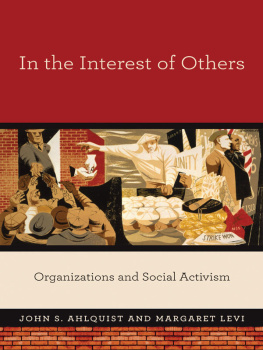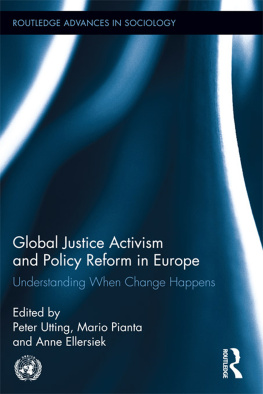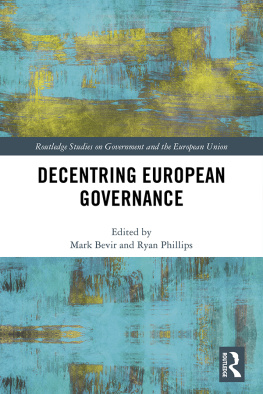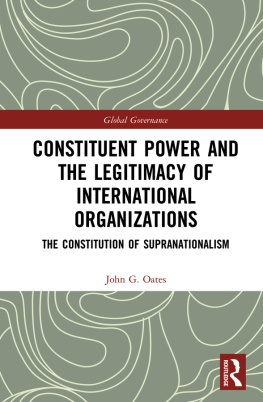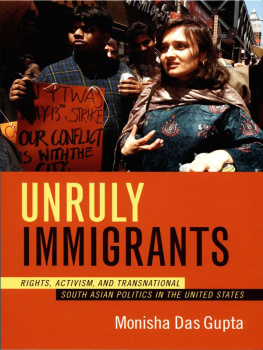
In the Interest of Others
In the Interest of Others
ORGANIZATIONS AND SOCIAL ACTIVISM
John S. Ahlquist and Margaret Levi
PRINCETON UNIVERSITY PRESS
Princeton & Oxford
Copyright 2013 by Princeton University Press
Published by Princeton University Press, 41 William Street,
Princeton, New Jersey 08540
In the United Kingdom: Princeton University Press, 6 Oxford Street,
Woodstock, Oxfordshire OX20 1TW
press.princeton.edu
Cover illustration: Anton Refregier (190579), San Francisco 34 Waterfront Strike c. 194048. Courtesy of the Library of Congress, Prints & Photographs Division, LC-USZC4-6564, and the family of Anton Refregier
All Rights Reserved
LIBRARY OF CONGRESS CATALOGING-IN-PUBLICATION DATA
Ahlquist, John S.
In the interest of others : organizations and social activism / John S. Ahlquist and Margaret Levi.
pages cm
Includes bibliographical references and index.
ISBN 978-0-691-15856-3 (hardback : alk. paper) ISBN 978-0-691-15857-0 (pbk. : alk. paper) 1. Labor unionsPolitical activity. I. Levi, Margaret. II. Title.
HD8031.A45 2013
322'.2dc23 2013009155
British Library Cataloging-in-Publication Data is available
This book has been composed in Sabon LT
Printed on acid-free paper
Printed in the United States of America
1 3 5 7 9 10 8 6 4 2
For David J. Olson
Comrade, Colleague, and Friend
Contents
Figures
Tables
Acknowledgments
Dedication of this book to David Olson hardly captures our debt to him. As the first Harry Bridges Chair in Labor Studies, he began an enduring relationship with the International Longshore and Warehouse Union (ILWU) that piqued our interest in this remarkable union and led to extraordinary access to people, archives, and information. David co-directed Union Democracy Reexamined with Margaret and approved Johns appointment to help manage the project in the summer before John officially became a graduate student at the University of Washington. He was a collaborator and co-author with Margaret for nearly forty years and a mentor and friend to both of us. He read and commented constructively on everything either of us wrote that dealt with labor or unions or workers. He advised us, prodded us, and praised us. He marched with us and drank with us. He was there for our celebratory moments and for those times when we needed a lift. He opened doors others could not. One of his last acts of friendship was his reading of the final manuscript, which bears his thoughts and influenceand corrections.
The ILWU is an organization where work is done in teams. We took their lesson to heart and benefited from the contributions of a very large team of graduate and undergraduate students who searched archives, undertook interviews, engaged in surveys, and wrote memos and papers that we draw upon extensively. Jon Agnone was the primary research assistant for more than four years. It was he who negotiated the contribution of the invaluable interview tapes from Howard Kimeldorf and William Finlay, two distinguished authors of earlier books on longshore work, and it was Jon who ensured the tapes were transcribed and coded for use not only by us but for future generations of scholars as well. He helped frame the survey and supervised it until, upon receiving his PhD in Sociology, he passed the torch on to Amanda Clayton. It was Amandas initiative and persistence that finally earned us the cooperation of all the locals we wished to include in the survey. Equally important, she decided to write her masters thesis on the changing residential patterns of three unions and the consequences for occupational community. Her maps and thinking gave us new insights into the various forms of social networks that develop (or fail to develop) as a consequence of membership. Other graduate students also played key roles in supervising undergraduates and providing research of their own: Barry Eidlin, on loan from Berkeley, researched the Minneapolis Teamsters; Devin Kelley wrote up the responses of different longshore unions to containerization; Rebecca Szper helped with the electoral data collection and analysis; Juliana Rigg and Alison Waggener Boyd ran focus groups; Antonina Gentile shared her knowledge of European waterfront unions; and John Hermanson supervised group interviews with pensioners. Anne Greenleaf and Jennifer Noveck provided additional assistance with the polishing of the final manuscript.
The undergraduates (many now long graduated) constitute an even longer list. Nowell Bamberger, Chris Croker, Byron Haworth, Morgen Myrdahl, George Robertson, Carrie Sachse, and Elizabeth Zamora wrote papers from which we draw heavily. Others engaged in essential coding, transcribing, survey analysis, and bibliographic work: Alex Aldea, Hester Angus, Angeli Bhatt, Kristin Ebeling, Randy Eng, Elizabeth Fawthrop, Max Frieda, Adam Goodwin, Jun Hwang, Tyler Jones, Ashleigh King, Brendan McDavid, Natalie Quist, Cheryl Ream, Michael Rodriguez, Armontae Smith, Igor Voloshin, and Lila Zucker.
We could not have built such a team without the funding of the National Science Foundation through SES-0717454, SES-0517735, and an REU (Research Experience for Undergraduates) grant. Additional funding came from the United States Studies Centre at the University of Sydney and from the Harry Bridges Center for Labor Studies for working groups on Union Democracy Revisited (with David Olson) and Waterfront Workers History (with James Gregory) and, through the Center, a Washington State Labor Research Grant. Levi received a seed grant for a preliminary and related project from the Russell Sage Foundation. Politics & Society provided funding for an early conference and Florida State University for a later one. The Jere L. Bacharach Professorship supported some travel and other expenses, as did both Florida State University and the University of Wisconsin. The Helen Riaboff Whiteley Center at Friday Harbor provided additional research time and space and a lovely atmosphere in which to cogitate, collaborate, and write. We also relied heavily on the staff and resources of the Noel Butlin Archives Centre of Australian National University, the International Longshore and Warehouse Union archives, the Cal State Northridge special collections, the archives of the Harry Bridges Institute, and the special collections of the University of Washington.
Numerous colleagues shared their time and expertise. We benefited immensely from their feedback, questions, and tough love. Michael McGinnis and the late Elinor Ostrom sponsored a book party at the Workshop for Political Theory and Policy Analysis, Indiana University, to discuss our penultimate draft. Their comments proved invaluable, as did those of the discussants, especially Torben Iversen and Elisabeth Wood, who read the entire manuscript and continued to engage with us after the workshop ended. Christopher Adolph, Ron Magden, David Olson, Shane White, Eugene Vrana, Joe Wenzel, and, of course, the reviewers, Mark Lichbach, Gary Miller, Ignacio (Pacho) Sanchez-Cuenca, and Kathleen Thelen, commented on the final draft. Indeed, we owe a special thanks to Pacho, who advised us at the outset and was there to give us feedback at the end. Others who provided useful comments on particular chapters and arguments were Matt Baggetta, Matt Baretto, Tim Bartley, Dan Cole, Cliff Carrubra, Kathy Cramer-Walsh, Torun Dewan, Eric Dickson, Scott Gehlbach, Avner Greif, Jeff Hart, Macartan Humphreys, Edgar Kiser, Edmund Malesky, Greg Mallory, Steve Pfaff, David Soskice, and Erik Olin Wright. Lew Bateman and Chuck Myers, two of the best editors in the business, also offered good advice and support.
Next page
